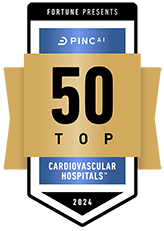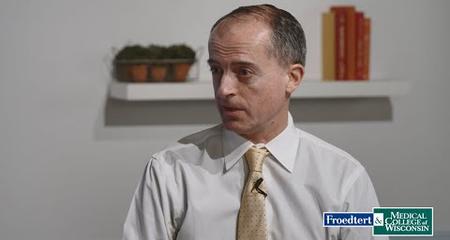ECMO therapy is temporary life support for people with heart failure and, in some cases, lung failure. It gives the heart and lungs time to rest and work toward recovery and is an option after other medical measures have been unsuccessful.
ECMO uses a machine that has a pump, oxygenator (artificial lung), cannulas (large tubes) and a blood warmer. The pump pulls blood out of the body through a large tube. The blood is sent through the artificial lung that oxygenates the blood and removes carbon dioxide before warming and pumping the blood back to the body. Your own heart then pumps the oxygenated blood to your body to support your organs. ECMO does not heal the organs, but it does give time for the organs to hopefully recover. Your heart does not stop when you are on ECMO.
ECMO for Heart and Lung Conditions
There are two types — veno-arterial (VA ECMO) and veno-venous (VV ECMO). The one we use depends on the organs that need the most help. Patients with heart failure and possibly lung failure benefit the most from VA ECMO, while VV ECMO works best for patients with severe lung failure.
There are several conditions that can lead to heart failure and, eventually, ECMO therapy. They include, but are not limited to:
- Heart attack
- Poorly functioning heart valves
- Arrhythmias
- Chronic disease — after heart operations or due to infection
Lung failure may result from several conditions and lead to treatment with ECMO, including:
- Pneumonias
- Viral infections
- Lung disorders
- Blood clots
- Acute respiratory distress syndrome (ARDS)
The goal of ECMO is improvement. We look at all aspects of heart and lung function, including:
- Blood pressure
- Chest X-rays
- Pulmonary mechanics (how much air is in the lungs, how easily the lungs fill with air with each breath)
- Lab work, such as blood gases
- ECMO flow
Determining eligibility for ECMO is based on several criteria that can vary for each patient. We recommend that you work with your providers to determine if you are a candidate for ECMO treatment.
What to Expect
ECMO is for patients who are very sick — most are already asleep from medications and have a breathing tube in place. Connecting a patient to the ECMO machine may take place immediately after surgery while still in the operating room — or, if the patient can’t be moved, in the Intensive care unit. Your care team will decide if ECMO is the right option and discuss the possibility with you or your family.
You may be intubated with a breathing tube. If this is the case, you’ll receive medication to keep you comfortable while it is in place. In some patients, even while on ECMO, the health care team will attempt to wake you up to remove the breathing tube and ventilator so you can participate in physical therapy, eat and communicate with family and staff.
ECMO can do the work of the heart or lungs for days, weeks or even longer. Long-term ECMO patients will require physical therapy to regain strength and balance.
Risks of ECMO
There are two different areas of risk with ECMO — during placement and while actively on the machine. When placing a person on ECMO, there can be injury to the blood vessels, heart or other organs, as well as bleeding — but these are very rare.
Once on ECMO, there is still a risk of bleeding, and also the risk of blood stream infections and clot development in the machine, the brain or other areas of the body, such as the arms and legs. A patient on ECMO may require blood transfusions.
If oxygen levels were low before placement, there may be permanent damage to the brain or other organs. ECMO does not reverse these effects. The hope is that the therapy lessens the strain on your organs, allowing them to recover.
Your Care Team
Each day, members of your care team make “rounds” and come to the bedside to talk about how you are doing and your care plan. We encourage loved ones to take part in rounds by sharing insights, questions and concerns.
The ECMO care team includes:
- Cardiothoracic surgery team — consisting of a surgeon, nurse practitioner or physician assistant — that directs your overall care while on ECMO
- Critical care anesthesia/ICU team — including the ICU doctor, nurse practitioner or physician assistant — that provides ICU care 24/7
- CVICU registered nurse who plans and directs nursing care
- CVICU technician who provides assistance with daily care and assists in nursing care
- ECMO coordinator who coordinates your care while on ECMO
- Perfusionist who manages the ECMO machine
- Pulmonologist who specializes in treating lung disease
- Respiratory therapist who helps with breathing problems, ventilator issues and breathing treatments
- Therapy team (speech, physical, occupational) to help with movement, self-care, speech or swallowing problems during illness
- Infectious disease physicians who monitor any complications and mange treatment in the event of an infection
- Nephrologist (kidney doctor) who monitors kidney function and manage any kidney (renal) disease treatment
- Nutrition/dietician who monitors nutrition intake while on ECMO and provide dietary education to promote healing
- Palliative care specialists to helps the patient and family achieve the best quality of life while living with illness
- Chaplain who provides spiritual care for patients and families
- Social worker or case manager to help with resources during the hospital stay, care after your hospital stay, coping mechanisms and finding resources to meet your needs
Our Cardiovascular Program continues to receive recognition as one of the top programs nationally. We are honored to provide high-quality, effective care for even the most high-risk patients.
-
Check Out Our Heart and Vascular Program Awards and Recognition
In its 2024 Specialty Excellence Awards, Healthgrades recognized Froedtert Hospital as one of America’s 50 Best Hospitals for Cardiac Surgery, one of America’s 100 Best Hospitals for Cardiac Care and one of America’s 100 Best Hospitals for Coronary Intervention, as well as other specialty achievements in various areas.

For the second year in a row, Froedtert Hospital was identified as one of the nation’s 50 Top Cardiovascular Hospitals™ according to an independent quality analysis based on a balanced scorecard provided by PINC AI™, and reported by Fortune. The hospitals recognized in the top 50 operated at lower cost and had better outcomes, recording significantly higher inpatient survival rates, fewer patients with complications, lower readmission rates and up to nearly $10,000 less in total costs per patient case. According to the study’s analysis, if all hospitals operated at the level of this year’s top performers, there could be 7,600 fewer deaths due to heart disease, 6,700 fewer bypass and angioplasty patients who suffer complications, and more than $1 billion in costs saved for the 2024 study year. Froedtert Hospital was ranked in the category of top teaching hospitals with a cardiovascular residency program. In this cohort of hospitals, Froedtert Hospital was ranked No. 4 in the country. No other hospital in Wisconsin was recognized with this national distinction.
The Society for Vascular Surgery's Vascular Quality Initiative (SVS VQI) has awarded Froedtert Hospital three out of three stars for its active participation in the Registry Participation Program. The mission of the SVS VQI is to improve patient safety and the quality of vascular care delivery by providing web-based collection, aggregation and analysis of clinical data submitted in registry format for all patients undergoing specific vascular treatments. The VQI operates 14 vascular registries.
The American Heart Association recognized Froedtert Hospital with its Get With the Guidelines® Heart Failure Gold Plus Award. In addition, the hospital was recognized on the AHA’s Target: Heart Failure(SM) Honor Roll and received the AHA’s Target: Type 2 Diabetes Honor Roll™ award.
The American Heart Association also recognized Froedtert Hospital with its Get With the Guidelines® — Coronary Artery Disease Mission: Lifeline STEMI Receiving Silver Plus and Mission: Lifeline NSTEMI Silver awards. These awards demonstrate our commitment to improving care by adhering to the latest treatment guidelines and streamlining processes to ensure timely and proper care for heart attacks.
The American Heart Association recognized Froedtert Hospital with its Get With the Guidelines® AFib Gold Award.
The Cardiovascular Intensive Care Unit (CVICU) and Neurosurgical Intensive Care Unit (NICU) at Froedtert Hospital have each received a silver-level Beacon Award for Excellence from the American Association of Critical-Care Nurses. This award recognizes unit caregivers who successfully improve patient outcomes and align practices with AACN’s six Healthy Work Environment Standards. Receiving this national three-year award with gold, silver and bronze designations, marks a significant milestone on the path to exceptional patient care and achieving a healthy work environment.





